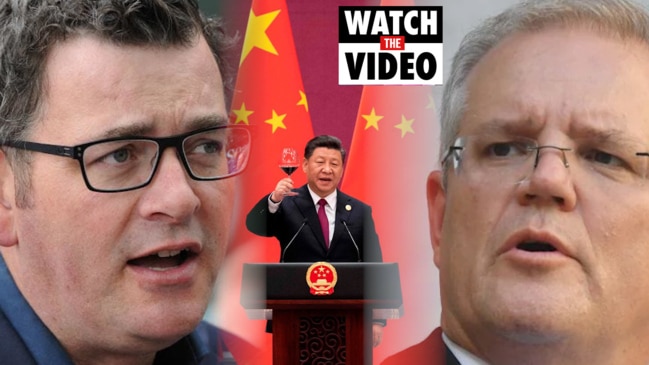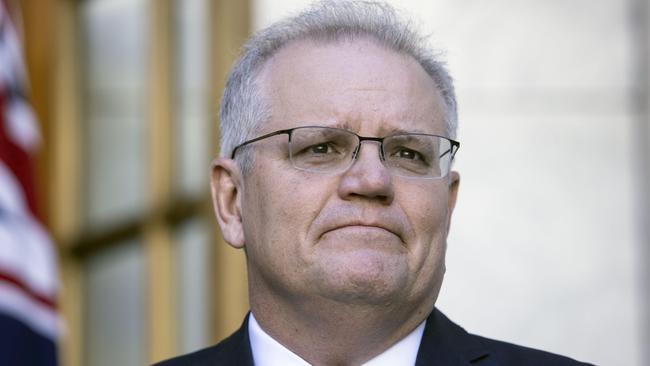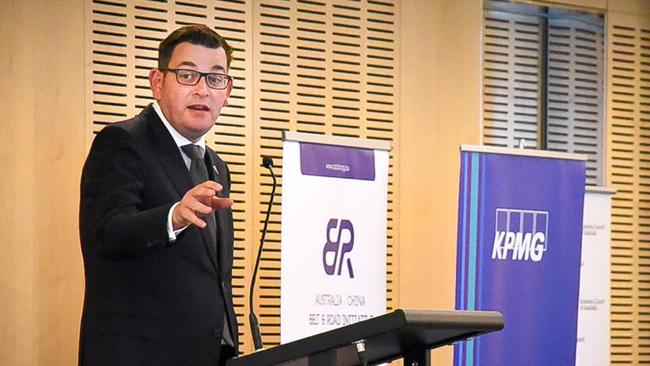PM intervenes to rip up Victoria’s belt and road deal
Daniel Andrews has questioned Scott Morrison’s priorities and demanded the Prime Minister come up with new trade markets for Victoria if the controversial Belt and Road deal with China is cancelled.

Victoria
Don't miss out on the headlines from Victoria. Followed categories will be added to My News.
Daniel Andrews has questioned Scott Morrison’s priorities and demanded the Prime Minister come up with new trade markets for Victoria if his Belt and Road deal with China is cancelled.
But critics of the Premier’s agreement say it is yet to produce any trade benefits and instead undermines Australia’s national interest by endorsing the Communist Party’s key “soft power” initiative.
Mr Morrison said on Thursday that he would not “prejudice the outcome” of sweeping new laws allowing the federal government to review and cancel agreements signed by states, councils and universities with foreign governments.
Asked about Victoria’s Belt and Road deal, Mr Morrison — who has previously called for it to be ripped up — said that if any agreements were “inconsistent with federal foreign affairs policy, they’ll go”.
He recently organised a national security briefing for state leaders to “know what I know”, but Mr Andrews said he only learned of the crackdown in a letter from Mr Morrison on Thursday night.
“If the Prime Minister’s got time to be doing those things, that’s fine for him. I don’t,” he said.
The Premier said the Belt and Road agreement was part of a “passport to export” to support Victorian jobs, and that he expected Mr Morrison would come up with “alternative trading arrangements, alternative free trade agreements, alternative markets” if it was scrapped.
“I’ll leave that to the PM to announce, but presumably that’s coming, and it’s coming quick,” Mr Andrews said.
Mr Morrison’s plan received widespread backing, including from senior Labor figures concerned about Victoria’s decision to support Belt and Road.
Federal Labor leader Anthony Albanese said he was “very supportive” of the federal government looking after Australia’s national interests in foreign policy.
He said federal Labor had shifted to oppose signing up to Belt and Road because of the Chinese Communist Party’s “far more interventionist” approach in recent years.
Foreign Affairs Minister Marise Payne said Victoria’s lack of consultation with the commonwealth on the deal had partly prompted the new laws.
Victorian Liberal senator James Paterson said the agreement was “completely unnecessary to facilitate trade”.
“The best thing that facilitates trade between Australia and China is the free trade agreement between Australia and China, which the federal government … brought into force in 2015,” he said.
“The truth is that what (Mr Andrews) has signed with the Chinese Communist Party is effectively a glorified joint press release.”
Other agreements to be reviewed under the changes include a controversial deal Monash University signed with the Commercial Aircraft Corporation of China, which had been tied to the state-backed theft of intellectual property from US rivals.
PM UNVEILS NEW CRACKDOWN
The controversial deal linking Victoria to the Chinese Communist Party’s global infrastructure initiative is a key target of the crackdown to be unveiled by the Prime Minister on Thursday.
Under the changes, the federal government will have the power to review all deals signed by state governments, councils and public universities with foreign governments.
Asked if he would scrap Victoria’s Belt and Road deal, Mr Morrison said that he would not “prejudice the outcome of any decisions the Foreign Affairs Minister might make”.
He said decisions would be made under “proper processes”, and that he had already raised concerns about agreements with state leaders as necessary.
“If (agreements are) inconsistent with federal foreign affairs policy, they’ll go,” Mr Morrison said.
The Prime Minister said that where foreign governments sought to undermine the sovereignty of Australia’s foreign policy by doing deals with state governments, the country needed to “protect itself”.

“We need to work together to protect Australia’s national interest,” Mr Morrison said.
Any arrangements deemed inconsistent with Australia’s foreign policy or which adversely affect our overseas relations will be torn up.
“It is vital that when it comes to Australia’s dealings with the rest of the world we speak with one voice and work to one plan,” Mr Morrison said.
Construction contracts for any major projects tied to Victoria’s Belt and Road deal could also be terminated, with Foreign Affairs Minister Marise Payne able to obtain court injunctions to enforce her decisions.
The move will place extreme pressure on Daniel Andrews to ditch the agreement he signed in the days before the 2018 state election without the approval of the federal government.
Mr Morrison called on him to rip up the deal in June, saying Victoria should not “act inconsistently with the federal policy”.
The Herald Sun understands he also wrote to the Premier about his concerns at the time.
But despite Mr Morrison raising national security issues, Mr Andrews stood firm, saying he would “stay the course” on plans to lock in the next stage of a Belt and Road plan with the Chinese government soon.
“We are absolutely committed to making sure that we have as many agreements as we possibly can have to get more Victorian-made product into China,” Mr Andrews said.
Victoria has a series of agreements with Chinese authorities, including on health, education, culture and public-private infrastructure partnerships.
The new laws — underpinned by the commonwealth’s constitutional control of foreign affairs — were raised with Mr Andrews and other state leaders at a top-level national security briefing recently arranged by Mr Morrison.
If the legislation passes the parliament, state governments, councils and universities will have to notify the commonwealth of all their agreements with foreign governments.

This includes sister city relationships, memorandums of understanding for university collaboration, local trade partnerships, and cultural co-operation arrangements.
A new unit in the Department of Foreign Affairs and Trade will be tasked with reviewing all agreements — which will be placed on a public register — and alerting the government to those which raise issues.
The unit will also review any proposed agreements which will now require federal government approval.
“Australia’s foreign policies and relationships must always be set to serve Australia’s interests,” Mr Morrison said
“These changes and new laws will ensure that every arrangement done by any Australian government at any level now lines up with how we are working to protect and promote Australia’s national interest.”
“Where any of these agreements undermine how the federal government is protecting and promoting our national interests they can be cancelled.”
Senator Payne said the changes would fix the fact that there was “no legislative requirement, nor clear understanding, that states and territories consult properly with the commonwealth on arrangements with foreign governments”.
Mr Andrews has received widespread criticism for the Belt and Road deal, including from senior Labor Party figures, with concerns raised about the state government’s failure to seek advice from or consult with DFAT.
Foreign policy experts warn Chinese President Xi Jinping is using Belt and Road as geopolitical propaganda weapon, exploiting differences such as Victoria’s split with the commonwealth.
WHY FEDERAL LABOR SAID NO TO BELT AND ROAD
The Chinese Government’s increasingly “interventionist” policies and actions were behind federal Labor’s Belt and Road stance shift from support to rejection in recent years.
Labor leader Anthony Albanese said he did not support Belt and Road deals and would not sign any if he was Prime Minister.
“They [the Chinese Government] are far more interventionist than was the case under previous regimes,” Mr Albanese told the National Press Club on Wednesday
“That, of course, has to be taken into account when we’re talking about Australia’s national interests.”
He said he was supportive of the federal government controlling foreign policy.
“We’ll examine the legislation, but the idea that the national interests should be looked after by the federal government when it comes to foreign policy is something that we’re very supportive of,” Mr Albanese said.
When asked if he had expressed his opposition to Belt and Road deal to Daniel Andrews, Mr Albanese said he had “expressed it publicly”.
“[A] government I lead would not participate in the scheme,” Mr Albanese said.
MORE NEWS
PM TELLS ANDREWS TO RIP UP CHINA DEAL
LABOR MAY FACE VOTER BACKLASH OVER BELT AND ROAD DEAL
